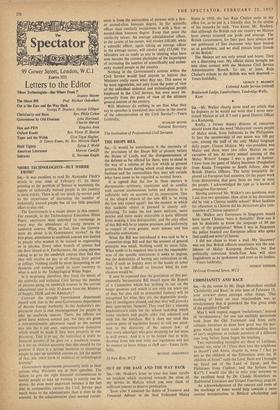Letters to the Editor
`More Technologists—But Where From ?'
Stanley Mayne The Shoos Bill Prof Michael Oakeshatt Out o' the East and the Way Back George P. Bradney, George Edinger Christian:ty and Race Rev. Philip Cohen Government by Old Etonian John Hart/and, Charles Harvey Hen and PEN Kingsley Amis Oxford Roads Rev. Victor H. Beaton Taper and the Welsh Glyn regal Hughes, D Etnrys Evans, Rt. Rev. Mervyn Haigh Hold Tightly Sylvia J. Webb American Literature Marcus Cunliffe Indexers G. Norman Knight
'MORE TECHNOLOGISTS—BUT WHERE
FROM?'
SIR,—It was excellent to read Sir Alexander Fleck's article in your issue of February 15. Its direct pointing to the problem of finance in increasing the supply of technically trained people in the country is most timely. There is all too much lip-service paid to the importance of increasing the number of technically trained people but all too little practical effort to that end.
The Government is a major sinner in this respect. For example, in the Technological Education White Paper, employers were exhorted to encourage in every way the attendance of young persons at sandwich courses. What, in fact, does the Govern- ment do about it in Government service? In the first place, attendance at sandwich courses was limited to people who wanted to be trained in engineering or in physics. Every other branch of science had the door closed to it. Furthermore, the young persons asking to go on the sandwich courses then find that they will receive no pay at all during their period at college. Nothing could be more dampening to en- thusiasm and nothing could be more contrary to what is said in the Technological White Paper.
Is it surprising, therefore, that from the whole of the scientific and technical Civil Service the number of persons going on sandwich courses in the current educational year is only 30 drawn from the Ministry of Supply, DSIR and the Admiralty?
Contrast the straight Government department record with that in the near-Government department of Atomic Energy Authority. In the Authority's em- ployment there is real encouragement for people to take up sandwich courses. There, the officers are given leave without normal pay, but they are given a non-pensionable allowance equal to the normal pay less the 6 per cent. superannuation deduction which would be made if they were properly in em- ployment. That is to say, the individual is under no financial penalty if he goes on a sandwich course. Is it not an obvious necessity that this should be the position if there is a serious intention to encourage people to take up sandwich courses or, for the matter of that, any other form of technical or technological training?
Government departments persistently belie in their actions what Ministers say in their speeches. The failure to give the right financial circumstances to enable people to take up training is merely one in- stance. An even more important instance is the fact that in comparative careers the Civil Service phys much more to the administrator than it does to the scientist. In the administrative class normal recruit-
ecruit-
ment is from the universities of persons with a first- or second-class honours degree. In the scientific officer class similarly recruitment is with a first- or second-class honours degree. From that point the similarity ceases. An average administrative officer, in the course of his career, will receive £68,000, while a scientific officer, again taking an average officer in the average career, will receive only £53,000. Yet Ministers are as ready as any in uttering what have now become the current platitudes of the importance of increasing the number of scientifically and techni- cally trained people in the country.
Nothing in the Government's actions within the Civil Service would lead anyone to believe that Ministers really mean what they say. This seems to be most regrettable, not only from the point of view of the individual technical and technological people employed in the Civil Service, but even more im- portantly from the point of view of the ultimate general interest of the country.
Will Ministers do nothing to see that what they say in speeches is translated into action in the course of the administration of the Civil Service?—Yours faithfully, STANLEY MAYNE General Secretary










































 Previous page
Previous page